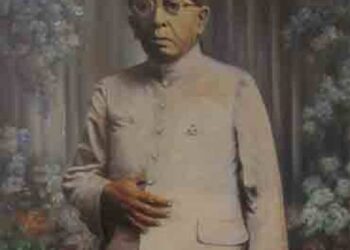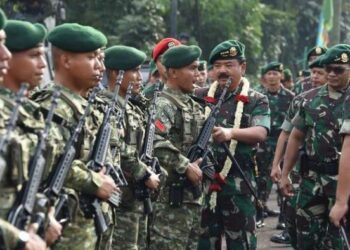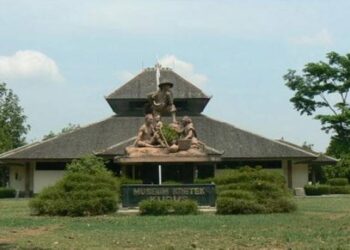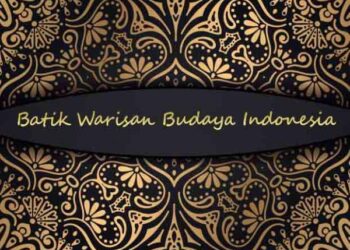Since the beginning of the New Order there has been an increase in the socio-political role of ABRI. The cause is because before the G30S/PKI there had been infiltration of PKI into the hampers of all organizations in Indonesia. In that infiltration, the PKI not only managed to incorporate its members into each organization, but it was also even able to become a member in some of the organizations it entered. In the body of the TNI even if there is infiltration but from the PKI is not able to affect the leadership of the TNI, except in some units such as Yon 530.
Increasing The Socio-Political Role of the Armed Forces of the Republic Indonesia
At a time when the G30S/PKI can be defeated, there is a cleansing movement against elements that still have something to do with the PKI. As a result, there are many vacancies in government

agencies. This vacuum is caused by the PKI’s mental terror movement against many parties so many people lose their leadership power.
Therefore, at the beginning of the New Order the vacancy also occurred in the leadership of the organization as well as government agencies. The solution used to cover this vacancy then many ABRI officers were assigned as employees in government agencies and SOEs(BUMN). It can be said that at that time the work of ABRI was blasted. In contrast to the 1950s when the Indonesian government took over the Dutch company, so President Sukarno asked KSAD Nasution to fill the leadership of the company that was taken over and that was the first time the TNI was planned. Although at that time the number of works is relatively limited and only in the field of ed. But after the g30s/PKI the work of the TNI almost all aspects of the organization exist. Please also note that the implementation of ABRI’s socio-political functions is relatively rare, and is usually only felt when there is one important event for the country and nation, such as during the first and second Dutch military aggression, and other matters related to defense and security. Because as a socio-political function in the more than one function of ABRI is a role that is given through its leadership in the form of giving opinions and advice to the government on issues and suggestions on issues that are generally political, different in 1966 when ABRI also entered into government organizations and agencies. The presence of ABRI employees is solely the intent of leadership and management, open as an expert or an expert in the field of work. Because the principle of abri employee severance is on the basis of the request of the organization concerned, then in 1966 there was quite a lot of demand. The benefit of this policy is economic rehabilitation. National builders conducted since April 1, 1969 have made progress for the nation. That progress can be seen from the ability of civilians to run organizations where they work. There has also been progressed in many State posts, such as ministers and ambassadors. Therefore, gradually the role of ABRI has begun to diminish.
In the 1970s there was a change in attitudes in students who initially supported ABRI and together to “fight” the PKI, even during the New Order against ABRI. According to this book, the change in student attitude is influenced by psychological factors, namely that students should always play an important role in the development of the nation. The psychological condition that urges students to perform prominent roles realized in the form of radical actions is also triggered by competition between universities. Therefore since the 1970s, there began to be a harsh criticism of students in the attitude of ABRI. This criticism began to emerge when there were elements of ABRI that lacked good attitude. There are even actions from ABRI members that harm the public interest (the people). Therefore, there needs to be a reduction in ABRI’s involvement in the work. But those who criticize ABRI’s work are often less aware that in order to replace the role of ABRI employees there must be adequate civil leadership. The conclusion is that the key lies in the personal coaching of civilians and the experience that is lived between ABRI and civilians. In fact, ABRI leaders from the 1945 generation have said there are steps in the implementation of ABRI’s socio-political functions that are adapted to Indonesia’s development. Because the bifunction of ABRI means that ABRI and its members have a sense of responsibility for the achievement of a just and prosperous society, not a society dominated by the military.
One of the impacts of staying away from ABRI is the inadequate understanding of the students themselves and the scholars about Dwi Fungsi ABRI. While from the ABRI itself there is at least an increasingly careful effort to make the implementation of ABRI’s socio-political functions truly ed for the achievement of a just and prosperous society based on Pancasila.
FACING A VARIETY OF STRATEGIC ISSUES
During his time as an independent country, the Indonesian nation has faced various strategic issues that jeopardize its survival. Abri has always played an important role in dealing with and addressing these strategic issues.
CONFRONTATION WITH MALAYSIA
The confrontation began in 1963 and arose for several reasons:
First, the confrontation occurred because Indonesia was suspicious of the British intention of converting the Federation of Malaya into Malaysia which included Malaya, Singapore, Sarawak, and North Kalimantan. The second reason is the PKI’s insistence that Beijing and Moscow fight the Malaysian concept. Whereas previously there was an attempt to form a union between Indonesia, the Philippines, and Malaya (Maphilindo). At that time, the TNI fully supported the establishment of Maphilindo as an attempt to unite the Malay family. But due to President Sukarno’s efforts to form a new force or the New Emerging Forces with GANEFO (the Games of the New Emerging Forces) which wanted to rival the Olympic Games as a worldwide sporting gathering as well as CONEFO (the Conferences of the New Emerging Forces) which was formed to replace the role of the United Nations. This establishment was initiated because President Sukarno disagreed with the Concept of Malaysia which he thought was British colonialism in Southeast Asia. When it came to the formation of new powers, the TNI began to disagree because it was feared that Indonesia’s economy and finances would be far from adequate. Moreover, with the heat of relations between President Sukarno and Prime Minister Tengku Abdul Rachman, the formation of the union failed. Although from the Philippine side, President Macapagal has tried to reunite the two leaders, among others with the holding of talks in Tokyo, but all failed. With the conflict between Indonesia and Malaysia, the relationship between the two countries was damaged and led to the breakdown of all kinds of relations between the two countries. On September 21, 1963 Indonesia severed trade ties with Malaysia and Singapore, while Malaysia severed all ties with Indonesia and the Philippines. Even between Indonesia and Malaysia, both strengthening their borders with military force, the Malaysians themselves were helped by the British. Then there was the defence agreement between The United Kingdom, Australia, New Zealand, Malaysia and Singapore, the Five Power Defence Arrangement (FPAD), which until 1995 remained and functioned. Although ASEAN has been established since 1967 and the confrontation between Indonesia and Malaysia has been ended since 1966. In fact, the problem with the confrontation with Malaysia itself was the resistance to the British that the United States helped because it showed a resistance attitude towards the establishment of Maphilindo.
NATIONAL RESILIENCE CONCEPT
In 1974, a concept called National Resilience was established by the National Defense Institute, whose name was later changed to Lembaga Ketahanan Nasional, this concept was taken as an effort to try the best for the Indonesian nation. This concept needs to be created and developed for reasons, namely:
- Facing various problems in the form of obstacles and distractions for the struggle of the Indonesian nation to achieve its goals, and threats to the survival of nations and countries that include society and its people as a whole.
- National development that focuses heavily on the domestic industrial economy, so that the economic progress of small and traditional entrepreneurs is not destroyed so by modernization.
The understanding of National Resilience is a dynamic condition of a nation consisting of toughness and tenacity and the ability to develop national forces in the face of all kinds and forms of threats, challenges, obstacles and disorders both from within and outside, directly or indirectly that threaten and compromise the integrity, identity, survival of the nation and the country and the achievement of its national goals. The point in National Resilience is the need for dynamic conditions of the nation that contain tenacity and toughness that generate national strength. The focal point of this concept is not just the power of fiction or mental strength alone, but the power entirely covering various aspects. The basic principle of National Resilience consists of two aspects, namely welfare and security. The creation of harmony between welfare and national security. It is a high level of National Resilience in a nation and a country.
The understanding of tenacity and toughness and dynamic conditions of the nation must always be a concern to create National Resilience. Tenacity contains implications of birth and mental tenacity, while toughness contains stability, ability, and intelligence. From there it should bring about dynamic conditions of the nation. Because only a dynamic nation can give birth to a national force that is crowded to face and overcome the various threats, challenges, obstacles, and disorders of today.
EAST TIMOR’S PROBLEMS
The problem in East Timor was caused by a power struggle between parties formed in East Timor between Fretilin, Apodeti, and UDT. Indonesia’s action against East Timor began when there was an approach between the Portuguese government and the Indonesian government to resolve the problems in East Timor. The Republic of Indonesia engaged with East Timor because of the principle of fighting all forms of colonization on the face of the earth. Portugal’s occupation of East Timor was the reason for Indonesia’s involvement, so the nearby colonization came to an end. But there was an error when Indonesia used one military attack that had a devastating effect on Indonesia itself. This is due to the incompleteness of the problems that occur in East Timor and result in constant conflict.
The operation carried out by the Indonesian side suffered various errors when using the power of the armed forces when aimed at ending the East Timor problem. East Timor’s problems have been faced by the TNI with an erful approach. The first is the wrong strategic approach when the instructions for Intelligence Operations are implemented with one Open Conventional Attack, one Spectacular Inter-Force Joint Operation but not successfully achieving the objectives of the operation in full. Second, when facing guerrilla resistance Fretilin and his supporters instead carried out Counter-insurgency operations widely and systematically, but the heavy point was placed on the implementation of Conventional Operations which is certainly a difficult approach to achieving broad results.
DECENTRALIZATION OF THE REGION
The next strategic problem facing Indonesia is the provision of decentralization of unrealized areas caused by some of the obstacles faced, one of which is the centralization after independence. In 1950 the centralization of government became stronger with the use of a democratic system led in the administration of government.
In the beginning decentralization to the regions will be difficult, because from some parties say that decentralization bias led to the expansion of abuse of authority and corruption. It is not even impossible for those who reject decentralization, that there will be a sense of regionality that is too strong to give rise to the separatism movement in its region. But on the other hand, those who agree on decentralization consider that granting this program in each region can precisely be a way to reduce and eliminate abuse of authority. The decisive thing in the decentralization arrangement itself is the financial division between the center and the region, where we can take for example in the People’s Republic of China which dares to give broad authority to its regions and it is able to stimulate progress in the southern and inland regions in order to be able to develop.
Therefore, if the Indonesian government succeeds in decentralizing sengan good, then it will reduce the pressure that is now relentlessly done against pancasila ideology over the United States that wants the ingrained system of liberalism-individualism in Indonesia. In addition, the founders of the nation have stated that the Republic of Indonesia is a unitary State, but still gives broad autonomy to its regions, in order to one day realize security and prosperity throughout the People of Indonesia.
CHINA’S PROBLEMS
In the face of this problem should not be allowed racial attitudes and ways of thinking, because it is not a matter of race, politics or culture. But when racial, cultural, and political issues arise, it is only the tip of the economic problem. This is due to the social disparity between local natives and people of Chinese descent who experience different levels of well-being. Especially when viewed from citizens of Chinese descent reaping such strong economic strength that with only about 5 million in Indonesia, they are able to dominate the national economy. This economic strength is shown to be none other than because there are several factors, namely the relationship of relatives and relatives, and the nature of help among the Chinese spread across Southeast Asia to Hong Kong. This is what gives rise to the power of business through a network system that is very effective in the field of trading. Because there is this network system, chinese businesses are not very dependent on the banking system in Indonesia. This should be the trigger for the spirit of indonesian indigenous people to have high national competitiveness, in the economy and especially investment.
The need to develop large and quality small and medium enterprises in Indonesia immediately creates a large, resilient, and resilient layer of small and medium-sized entrepreneurs. This result will strengthen the power of the indigenous economy and at the same time strengthen the national economy. So what the Indonesian government needs is to strengthen the condition of the indigenous people in the ability to try and improve the quality of the government bureaucracy so that it does its job with full national competitiveness.
BIBLIOGRAPHY
1. Sejarah Militer, ringkasan buku “KEPEMIMPINAN ABRI DALAM SEJARAH DAN PERJUANGAN” halaman 246-297.















